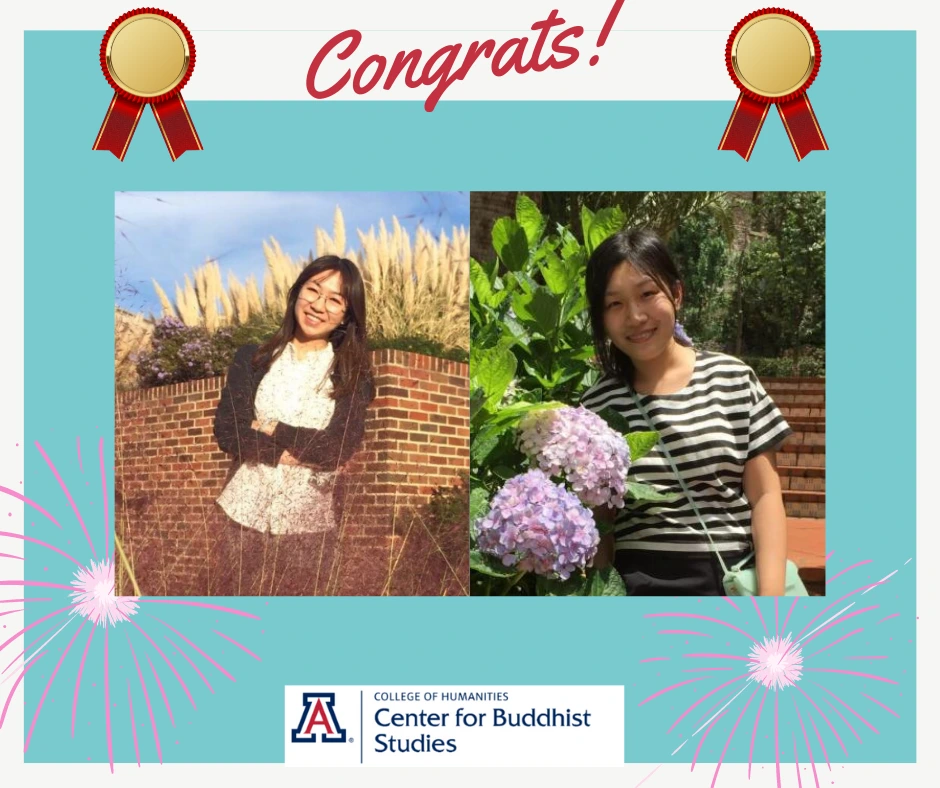
The University of Arizona Center for Buddhist Studies and Department of East Asian Studies are pleased to announce the recipients of the Khyentse Foundation Doctoral Fellowship for the 2021-2022 academic year. Lu Zhang (Left) and Youteng Bi (Right), both advanced doctoral students in EAS, will equally split the award.
Lu Zhang is a PhD candidate studying Chinese Buddhism in the Department of East Asian Studies. Her dissertation, titled “Presenting the Buddha: The ‘Sages and Worthies as Incarnations’ in Chan Historiographies in Song China,” examines historiographical works in Chinese Chan Buddhism from the 11th to 13th centuries, with a particular focus on a rarely noticed group of individuals who are considered earthly manifestations of Buddhist deities. Compiled into a specific section which features historical figures as incarnated Buddhist deities (abbreviated Incarnation section) in Chan historiographies, the individuals from diverse traditions such as Tiantai, Pure Land, and Daoism, are venerated as Buddhist ideals. Since historiographies in Chan Buddhism are customarily used for preserving genealogical information of Chan schools and essential teachings of Chan masters, the incorporation of the section introduced a remarkable change during this era. This project not only inspires us to reflect on the value and function of Chan historiographies, but also extends the existing scholarship on the study of Song Buddhism by thoroughly examining the Incarnation section as an important yet undervalued social indicator of the development of Buddhism.
Youteng Bi is currently a fifth-year PhD student in the Department of East Asian Studies at the University of Arizona. Her research project examines a 17th-century Buddhist reading guide, Yuezang Zhijin 閱藏知津 (Guide to Reading the Tripitaka), written by Ouyi Zhixu 藕益智旭. Previous scholarship has explored its bibliographical value as a Buddhist catalog. However, the context of its composition and its significance in the 17th-century Buddhist revival has not been fully studied. Moreover, often translated as catalog, the Chinese mulu 目錄 differs from a dry list of books and often contains more sophisticated organizational structures as well as exegetical commentary for each entry. In this sense, Chinese Buddhist mulu had more ideological significance than the straight-forward information retrieval systems that characterize current library catalogs. Furthermore, reading, disseminating, and writing Buddhist texts became a prevalent form of spiritual practice among the literati to express aesthetic taste and disposition. This project will examine the content and the structural scheme of Yuezang Zhijin and situate its composition in the social and cultural context of 17th-century China. Instead of being a mere list of book titles for cataloging purposes, Yuezang Zhijin is closer to an encyclopedic work on Buddhist scriptures or an educational book, in the modern sense, for common readers in the 17th century. Therefore, the study on Yuezang Zhijin will also be valuable for rethinking the concept of “textual modernity” in East Asia.
The Khyentse Foundation Academic Development Committee selected the University of Arizona for their Doctoral Student Financial Support program for four years starting in the academic year 2020-2021. Each year, the fellowship awards $25,000 USD to support one or more doctoral students.
The Khyentse Foundation started this new program with the goal of supporting Buddhist Studies doctoral students. Although academic settings and programs differ by country, continent, and even region, the foundation has identified common themes and has determined several ways in which they believe they can help these students, especially during their dissertation research and writing. We are grateful to the Khyentse Foundation for this timely award. In addition, the Khyentse Foundation supports our Hangzhou Buddhist Culture project, Khyentse Foundation Buddhist Studies Lecture Series, and the Khyentse Foundation Student Award.

